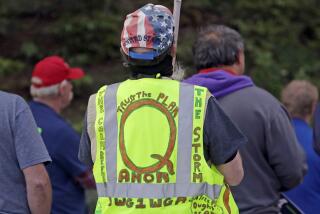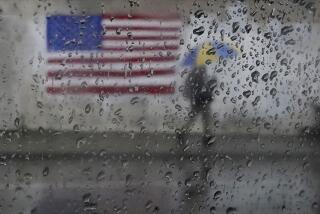In a Climate of Fear, Suspicion Can Ruin Lives
- Share via
Fifty years ago, McCarthyism and fear of communism made it easy to ruin lives with accusations based on rumors and bogus suspicions. Today, with the nation preparing for war, we again run the risk of pointing fingers when our motives have little or nothing to do with patriotism and may have everything to do with ambition and even petty emotions.
My father, Armando Arias, was one such victim of ill-founded suspicion.
In the fall of 1953, he returned to L.A. after three years in a prisoner-of-war camp on the Chinese-North Korean border. A first lieutenant who had also endured multiple captivities while spying for the U.S. Army behind German lines in World War II, he came home to a hero’s welcome, complete with a headline calling him the “Nation’s Ace POW.” Actually, he would later say, any member of the United Nations coalition troops who survived the freezing temperatures, torture and starvation in the Korean War camps was a hero.
Despite the beatings for having led three escape attempts, as well as the loss of his teeth from malnutrition, my dad managed to raise the morale of fellow prisoners by single-handedly building them a recreation room in the second of two camps in which he was held. He also fed and nursed many men back to a survival level of health.
Moreover, because of his previous war experience and quiet demeanor, the Puerto Ricans, blacks and lone Filipino chose him, a native of Nogales, Ariz., to be their squad leader, given that all “minority” American officers had been segregated in separate hovels from the other prisoners.
After he returned to stateside military duty, a former fellow POW accused my father of collaboration with the enemy while in the camp. What ensued was a weeklong “elimination hearing” held by a panel of senior Army officers to investigate a long list of charges brought about by one, apparently jealous, bigoted man. Once my father’s buddy in combat, as a prisoner he had asked my dad to stop befriending a certain intelligent but eccentric officer who was teaching my father -- a high school dropout -- math, music and chemistry. My dad refused because he was learning so much from the camp’s walking encyclopedia. “Someday you’ll be sorry,” threatened his jealous accuser.
My father managed to clear himself with the help of glowing, supportive testimonies by more than 40 fellow ex-POWs. But the damage, coming right after a three-year nightmare, was done.
Already showing signs of post-traumatic stress, he endured the grilling, though the hearing transcripts show that he felt humiliated and disgraced. During the following years he was passed over for promotion time and again as my mom, two brothers and I followed him from one grim posting to another.
He finally retired as a major. My parents’ marriage collapsed, my mother died at 48, and in 1979, my dad tried to commit suicide, practically on her grave.
After he recovered, he distanced himself from me and my brothers and then left us for good. We never saw him again.
Years of trying to find him and discover what destroyed our family led me to conclude that one man’s jealousy and ethnic bias triggered my father’s downfall. If the charges had not been made, I don’t believe he would have died, at 53, living as a hermit on a mountainside without his sons, as I later learned.
In these days when fear of terrorism can ignite exaggerated paranoia, I would caution would-be finger-pointers to examine their motives. One false accusation can bring about disastrous consequences for the innocent.


